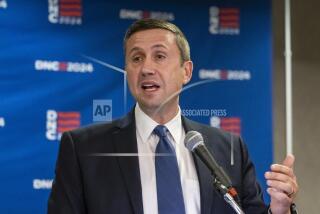May Be Boost for Volcker : Martin Will Resign as Vice Chairman of Fed
- Share via
WASHINGTON — Preston Martin, apparently convinced that he would not succeed Paul A. Volcker as chairman of the Federal Reserve Board, announced Friday that he would resign as vice chairman of the Fed.
Saying it was “not my personal objective to serve as vice chairman for another four years,” Martin announced he would step down at the end of next month and would not attend the scheduled meeting of the Fed’s monetary policy committee on April 1. He said he would return to San Francisco to pursue private business interests.
Martin’s resignation comes just days after disclosures that he and three other Reagan appointees to the Fed had privately outvoted Volcker on a decision to lower a key interest rate. Analysts viewed his resignation as a victory for Volcker in his efforts to maintain control over monetary policy and said it increased the possibilities that Volcker might be reappointed by President Reagan as Fed chairman when his term expires in August, 1987.
In late February, Martin--the first of four Reagan Administration appointees to the Fed--led an abortive attempt to force a cut in the discount rate despite Volcker’s opposition to the move as premature. But the 4-3 vote to lower the Fed’s lending rate to financial institutions from 7.5% to 7% was not immediately carried out because at least one newly appointed Fed governor, Wayne Angell, had second thoughts about the action, according to sources close to the Fed.
The brief coup attempt, one official said, led Volcker to the brink of quitting the highly powerful position at the head of the nation’s central bank, which he has held for 6 1/2 years.
In a face-saving compromise, Volcker, who favored a coordinated rate cut with other major industrial nations to avoid the possibility of a precipitous drop in the U.S. dollar, agreed to press West Germany and Japan for an early discount rate decision. Two weeks later, after German central bankers agreed to go along with the joint action to lower interest rates, the Fed voted unanimously to cut its discount rate to 7%.
Chief Challenger of Volcker
Martin’s resignation is expected to shore up Volcker’s position, analysts said, because it removes from the Fed the man who was regarded as the chairman’s chief challenger on the seven-member board.
“It offers an opportunity to lessen some of the unusual divisiveness on the Fed,” said W. Lee Hoskins, chief economist at Pittsburgh National Bank. “Even if Reagan appoints someone with similar views, Volcker should find it easier to manage the Federal Reserve.”
At a news conference, Martin dismissed questions about whether he was stepping aside because he had lost hope of becoming chairman of the Fed. “I see no reason to pursue that line of hypothetical questioning,” Martin said. “There is no vacancy.”
Martin, 61, would have been reappointed as vice chairman by President Reagan, Administration sources said, but Reagan declined to promise that he would appoint Martin as chairman when Volcker’s term expired.
More to Read
Inside the business of entertainment
The Wide Shot brings you news, analysis and insights on everything from streaming wars to production — and what it all means for the future.
You may occasionally receive promotional content from the Los Angeles Times.










